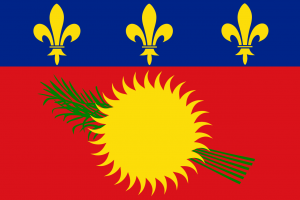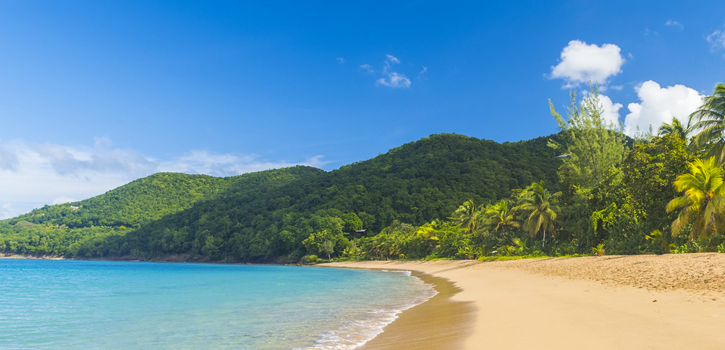Language/Guadeloupean-creole-french/Culture/Guadeloupe-Timeline
Jump to navigation
Jump to search
Rate this lesson:
Historical Timeline for Guadeloupe - A chronology of key events
Guadeloupe Timeline[edit | edit source]
| Date | Event |
|---|---|
| 1635 | After the island of Saint-Christophe (now Saint Kitts), the Compagnie des Isles d'Amérique missions Charles Liénard and Jean Duplessis, Sieur d'Ossonville, to colonize one or more uninhabited islands, such as Guadeloupe, Martinique or Dominica. Martinique deemed inhospitable, the duo chose Guadeloupe. |
| 1645 | The Compagnie des Isles d'Amérique entrusts the government of Marie-Galante to Constant d'Aubigné, father of the future Mme de Maintenon. |
| 1648 | The Compagnie des Isles d'Amérique goes bankrupt and the islands are for sale: Charles Houël buys the archipelago of Guadeloupe with his brother-in-law. The first French settlers settled in Les Saintes. |
| 1652-1814 | Fight between France and England. The stake is to appropriate the Saintes, which shelter unique anchorages to protect the fleets. |
| 1664 | Jean-Baptiste Colbert creates the Compagnie des Indes occidentales. The islands, including Guadeloupe, revert to the Crown. |
| 1674 | New bankruptcy, the West India Company is dissolved, but the Exclusive is maintained. |
| 1676 | The Dutch plunder Marie-Galante. |
| 1685 | Colbert's Code noir. |
| 1691-1816 | Many periods of English occupation. |
| 1720 | Gabriel de Clieu, governor of Martinique, introduces coffee to the islands. |
| 1725 | Deportation of lepers from Guadeloupe to La Désirade. |
| 1787 | sets up a colonial assembly to protect itself from the Revolution. |
| 1789 | sends five deputies to the Constituent Assembly. |
| 1793 | The envoy of the Legislative Assembly, Jean Baptiste Raymond Lacrosse, arrives in Guadeloupe with the tricolor flag. |
| 1794 | Decree for the abolition of slavery (Convention). The English occupy Guadeloupe, but Jean Baptiste Victor Hugues regains possession of the island and introduces the guillotine. |
| 1802 | Napoleon I reestablishes slavery. |
| 1815 | Prohibition of the slave trade. It will not be respected until 1831. |
| 1816 | End of conflicts related to the defense of Marie-Galante. |
| 1843 | Earthquake. The island was severely affected and a fire ravaged Pointe-à-Pitre killing around 3,000 people. With the reconstruction, Guadeloupe begins the industrial era. The first two sugar factories appear. There were 1863. |
| 1848 | The decree for the abolition of slavery is signed on April 27, 1848. The abolition of slavery is celebrated (public holiday) on May Guadeloupe and Saint-Martin, on October Saint-Barthélemy . The event is celebrated on a different day depending on the date of application of the decree on each island (May Martinique, June Guyana). Elections: Louisy Mathieu, ex-slave, represents Guadeloupe (Second Republic). |
| 1851 | The Colonial Bank (Banque de la Guadeloupe, the current Bank of the French Antilles, BDAF) is created. |
| 1852-1870 | The . Freedoms are subject to many restrictions. |
| 1854 | Beginning of Indian immigration. |
| 1863 | Second financial institution: the Colonial Land Credit. |
| 1871 | . Representation of the colonies in the National Assembly, in the Chamber of Deputies, then in the Senate. Many reforms have been launched in (secularism, free education, etc.) and are reflected in . |
| 1883 | The Lycée Carnot is created in Pointe-à-Pitre. |
| 1884 | Municipalities Act. |
| 1897 | Earthquake, Pointe-à-Pitre is partially destroyed. |
| 1898 | Hégésippe Jean Légitimus, one of the founders of the Socialist Party, is president of the General Council. |
| 1900 | Wireless telegraph in Le Gosier. |
| 1913 | First World War. The first conscripts leave. The war allowed Guadeloupe to export rum on a massive scale until 1922. |
| 1922 | The banana makes a timid entry into the economy. |
| 1928 | Devastating cyclone with raging seas and very violent winds: the dead are counted in the hundreds, the wounded are scattered on the island, the cultures destroyed, Basse-Terre is swept away. Pointe-à-Pitre, drowned, deplores serious damage. |
| 1936 | Adolphe Félix Sylvestre Eboué is the first colored governor. |
| 1940 | Constant Louis Sylvain Sorin, Vichy governor, arrives in Guadeloupe. He will leave in July 1943. |
| 1946 | becomes a French department. |
| 1961 | The Migration Office of the Overseas Departments (BUMIDOM) is created and takes charge of the organization of migratory flows towards the metropolis. |
| 1961-1965 | Independence unrest. |
| 1976 | Eruption of Soufrière. |
| 1979 | Cyclone David. |
| 1983 | Creation of the regional council. |
| 1989 | Cyclone Hugo. |
| 1994 | After the independence movement ran out of steam, power was taken over by the Guadeloupe "iron lady", Lucette Michaux-Chevry (at the regional council) and by the socialist left led by Dominique Larifla (at the general council). |
| 1991 | A underwater pipeline is built to bring fresh water from Guadeloupe to Désirade. |
| January 1994 | Marie-Galante, Capesterre and Grand-Bourgare set up as a community of municipalities, the first of the overseas departments. |
| 1998 | Celebration of the 150th anniversary of the abolition of slavery. |
| May 1998 | Election of Lucette Michaux-Chevry as president of the region of Guadeloupe. |
| 1999 | The Basse-Terre declaration. Signed jointly by the presidents of the regional councils Lucette Michaux-Chevry, Alfred Marie-Jeanne (Martinique) and Antoine Karam (Guyana), the declaration aims to make public the negative results of these three departments. The Martinican banana is at the center of the trade battle between the United States and Europe. |
| 2000 | Orientation law for overseas territories. |
| 2002 | The Guadeloupe economy is in crisis: tourism is affected by the effect of September 11 and banana production is damaged. |
| 2003 | More responsibility and less assistance. Could the answer be the Overseas Program Law? In April, the regional council announced the creation of a local economy support fund to boost investment. |
| December 2003 | Referendum on the institutional future: the "no" wins with 72.98% of the vote and an abstention rate of 49.66%. The reform proposed the creation of a single local authority replacing the region and the department. This single assembly would have benefited from competences in terms of cultural policy, sports, transport, taxation, town planning. |
| 2004 | The socialist candidate, Victorin Lurel, becomes the new president of the region. |
| November 21, 2004 | An earthquake of magnitude 6.3 woke Guadeloupe at 7.41 am. Its epicenter was located between Saintes and Dominica. We deplored a victim (a girl) in Trois-Rivières and significant damage in Saintes. |
| 2005 | Referendum on the European Constitution. Guadeloupe answers "yes" with 58.6% (low participation of 30%). The management committee of the European Commission is unblocking a total of 110 million euros in aid for West Indian bananas. François Baroin is the new Minister of Overseas Territories by the government of Dominique de Villepin, he replaces Brigitte Girardin. |
| 2007 | Saint-Martin and Saint-Barthélemy are detached from Guadeloupe and become overseas collectivities. |
| August 17, 2007 | Category 3 Cyclone Dean devastated part of the banana plantations. Its effects were much more devastating on Martinique. |
| 2009 | On January 20, the Lyannaj Kont Pwofitasion (LKP) collective, made up of unions and around 40 associations, launched a general strike which completely blocked the island's economy for 44 days, one of the longest social movements in the West Indies. Martinique joined Guadeloupe on February 5. On March 4, Elie Domota, spokesperson for the LKP, signed the Bino agreement. |
| March 14, 2010 | Victorin Lurel is re-elected president of the regional council. |
| May 2012 | Heavy flooding in the Pointe-à-Pitre region. Legislative elections bringing to the National Assembly 4 deputies from the left majority. |
| May 16, 2012 | Victorin Lurel is appointed Overseas Minister in the government of Jean-Marc Ayrault (socialist). He was replaced as President of the Regional Council by Josette Borel-Lincertin, elected on August 3, 2012. |
| April 2, 2014 | Victorin Lurel is not reappointed in the government formed by Manuel Valls. He is replaced by George Pau-Langevin, also Guadeloupe. |
| May 2, 2014 | Unsurprisingly, Victorin Lurel regained his chair as president of the regional council with 31 votes out of 38 following the resignation of Josette Borel-Lincertin. |
| April 2015 | Josette Borel-Lincertin dethrones Jacques Gillot, president of the Department from 2001 to 2015, and becomes president of the new institution now called the departmental council. |
| May 10, 2015 | Day of the commemoration of the abolition of slavery in metropolitan France, François Hollande inaugurates the Memorial ACTe, a center of Caribbean expression of memory of the slave trade and slavery in the presence of heads of state from the Caribbean and Africa. |
| December 18, 2015 | Ary Chalus becomes the 6th president of the Regional Council, obtaining 57.52% of the votes in the second round against the outgoing president, Victorin Lurel. |
| September 19, 2017 | Hurricane Maria passed, assessed in category 5. Two dead and two missing at sea, as well as extensive damage (banana plantations and vegetation on the island) were recorded. |
Source[edit | edit source]
- https://fr.wikipedia.org/
- https://www.petitfute.com/p5-guadeloupe/guide-touristique/c119583-histoire.html
World Timelines[edit source]
Other Lessons[edit | edit source]


